7 Comfortable Methods for Waking Up a Senior Dog
As our furry companions age, their sleep patterns and needs may change, sometimes leading to sleep disturbances in senior dogs. Waking up your senior dog may seem like a simple task, but it’s important to approach it with understanding and sensitivity, as their cognitive and physical abilities decline. Just like humans, older dogs can experience difficulties in their sleep-wake cycles, with some even developing cognitive dysfunction syndrome (CDS), which could affect their sleep quality and overall well-being.
To help your senior dog maintain a healthy sleep schedule, it’s essential to observe their behavior and identify any potential signs of sleep disturbances or anxiety. For instance, it is not uncommon for older dogs to experience night waking, disorientation, or restlessness during their sleep. By paying close attention to these behaviors, you can better address your senior dog’s needs and make adjustments to their sleeping environment or daily routine to ensure a more peaceful and comfortable slumber.
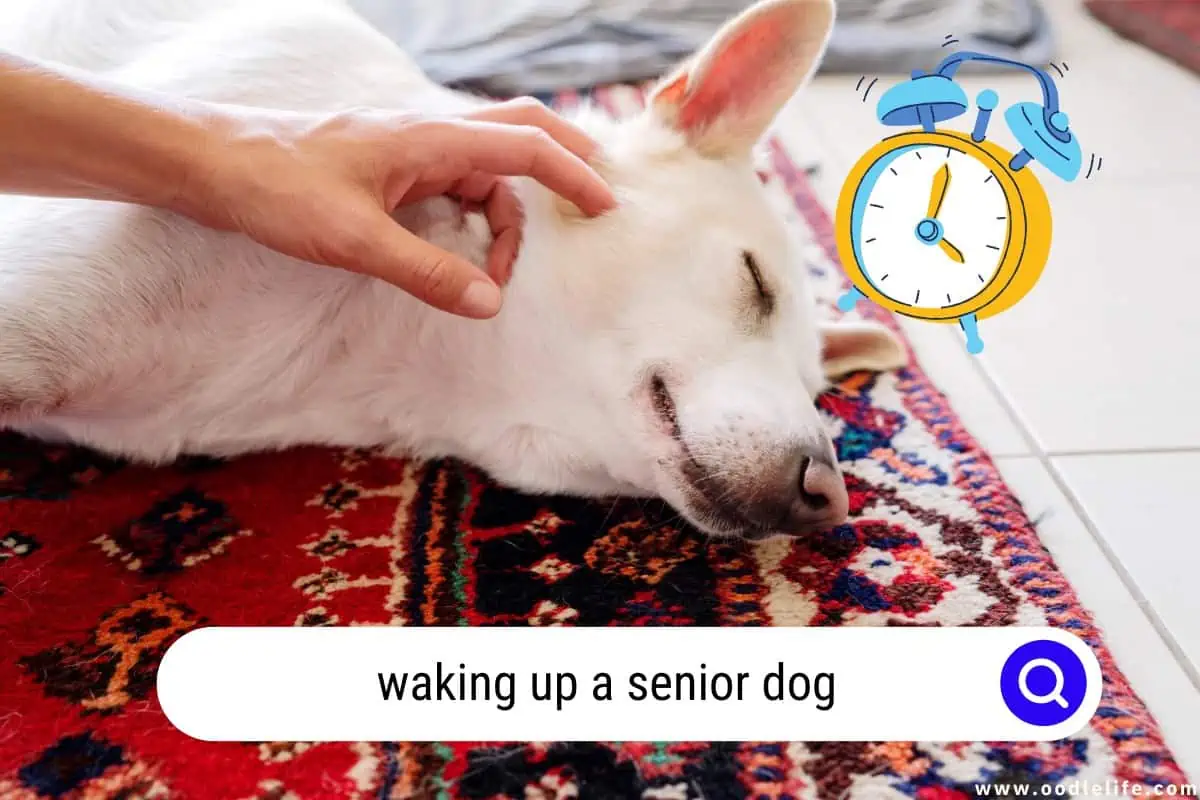
Despite these challenges, waking up a senior dog doesn’t have to be a daunting task. With a gentle and patient approach, you can make the waking-up process smoother for both you and your four-legged friend. If done correctly, this can not only enhance your dog’s quality of life but also help strengthen the bond between you and your beloved pet as they navigate the golden years of their life.
Understanding Senior Dogs
As our furry friends approach their golden years, it’s important to recognize the changes they experience, both physically and cognitively. In this section, we’ll discuss the physical effects of aging and the cognitive decline that may occur in senior dogs. When we better understand these aspects, we can help our elderly pups live a happier and more comfortable life.
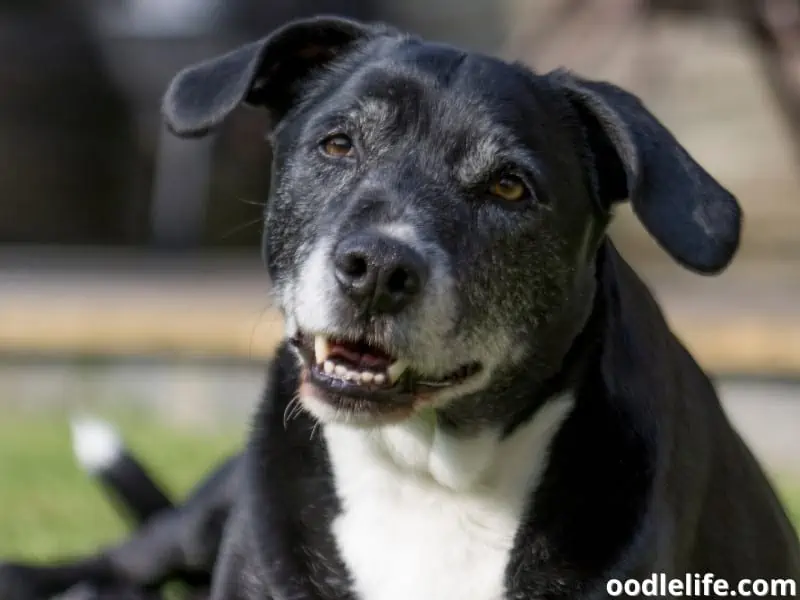
Physical Effects of Aging
As dogs age, their bodies undergo a series of transformations.
Some notable physical changes include:
- Decreased mobility: Joint issues such as arthritis may develop, making it harder for senior dogs to move around. Weight management and gentle exercise can help alleviate some discomfort.
- Weakened senses: Like humans, dogs’ senses may weaken with age. Their hearing, vision, and sense of smell might not be as sharp as when they were younger. Make accommodations in your home to help them navigate their environment more easily.
- Dental issues: Gum disease and tooth loss can become more common in elderly dogs. Regular dental check-ups and cleanings can help maintain oral health.
Cognitive Decline
Cognitive decline in senior dogs is not uncommon and is often referred to as Canine Cognitive Dysfunction Syndrome (CDS). Some signs of CDS include:
- Disorientation: Older dogs might seem confused or disoriented, even in familiar surroundings. This can be a result of deteriorating cognitive functions.
- Changes in sleep patterns: A senior dog may sleep more during the day and have trouble sleeping at night. Establishing a consistent routine can help regulate their sleep patterns.
- Increased anxiety: Dogs experiencing cognitive decline can become more anxious and exhibit behaviors such as pacing or vocalizing. Patience and reassurance can help minimize stress for your aging pup.
Understanding and recognizing the signs of aging in dogs is essential to provide them with the best possible care. By being attentive to these changes and adjusting their routine accordingly, you can ensure your senior dog continues to live a comfortable, happy life.
Typical Sleeping Habits for Senior Dogs
As dogs age, their sleeping habits may change due to various factors such as health, environment, and daily routine. Understanding the typical sleeping patterns of senior dogs can help pet owners better care for their furry friends.
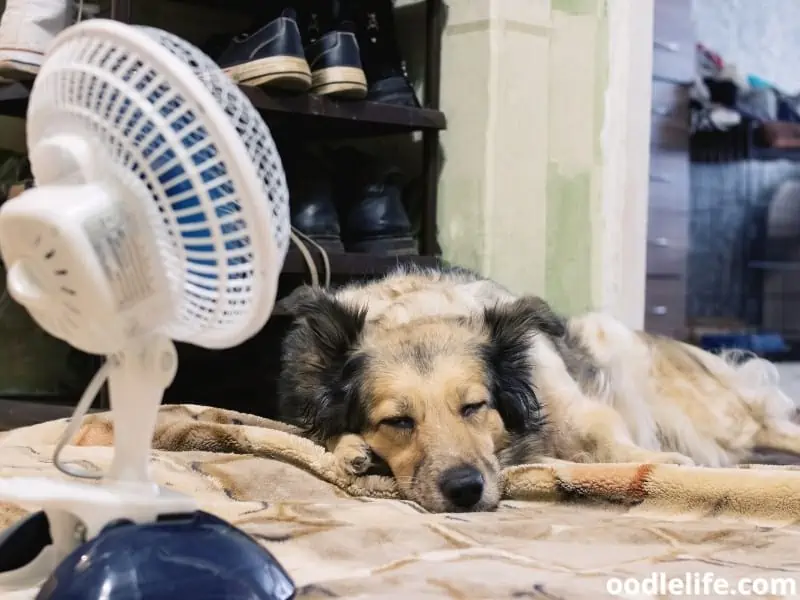
Changing Routines as Dogs Age
- Decreased Activity Levels: As dogs get older, they tend to become less active, which can lead to a shift in their sleep patterns. Senior dogs might sleep more during the day, leading to wakefulness at night. To help maintain proper sleep hygiene, ensure your dog has a comfortable sleeping space and a consistent bedtime routine.
- Longer Sleep Duration: Senior dogs, like people, require more sleep as they age. While younger dogs typically sleep around 12-14 hours a day, older dogs might sleep for up to 18 hours daily. So don’t be surprised if your old furry pal becomes a sleepyhead – it’s perfectly normal!
- Sleep Cycles and Stages: Dogs, just like humans, go through different stages of sleep. Senior dogs may experience disruptions in these sleep cycles, affecting their overall sleep quality. Providing a calm and quiet sleeping environment can help them achieve better sleep.
- Health-Related Factors: The quality of a senior dog’s sleep can be affected by health issues such as arthritis, cognitive dysfunction syndrome, or other age-related ailments. If you notice a significant change in your dog’s sleep patterns, it’s best to consult a veterinarian for appropriate treatment and advice.
In conclusion, being aware of the changing sleep routines and habits of your senior dog can promote better care and understanding of their needs. Keep a watchful eye on your furry friend, and make necessary adjustments to ensure they get the rest they need during their golden years. Don’t forget to give them an extra cuddle too – after all, they deserve it!
Health Conditions Affecting Sleep
Various health conditions can significantly impact a senior dog’s sleep quality and pattern. Firstly, arthritis is a common issue in older dogs. The discomfort and pain from joint inflammation can make it challenging for your furry friend to find a comfortable position to sleep in.
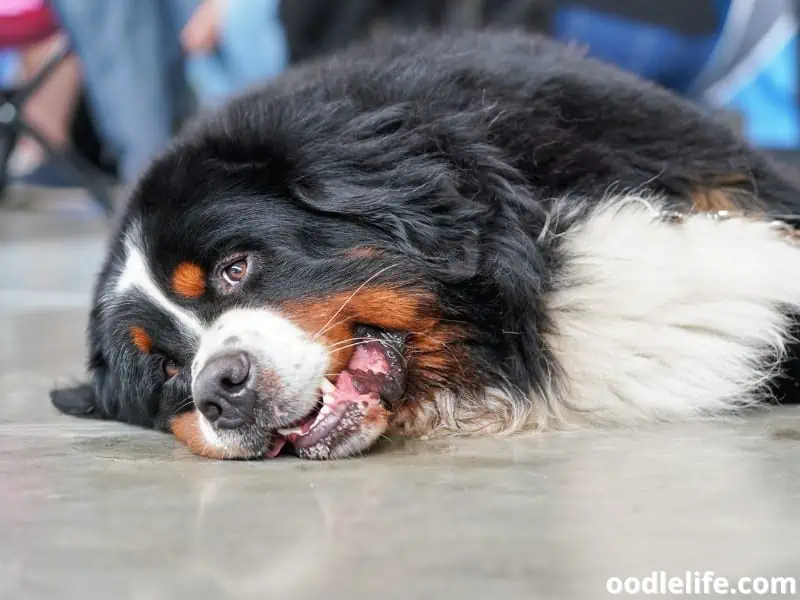
Cancer is another potential concern that can lead to sleep disturbances. Tumors can cause discomfort, pain, or internal pressure, making it difficult for your pet to rest peacefully. Additionally, cancer treatments such as chemotherapy can have side effects that affect sleep patterns.
Cognitive dysfunction becomes more prevalent as dogs age and can result in sleep disturbances, often compared to dementia in humans. Disorientation and changes in social interactions often accompany this condition, making it harder for the senior dog to settle down and sleep.
Heart failure can also affect sleep quality, as it leads to breathing difficulties and coughing episodes. Senior dogs with heart failure may struggle with sleeping and wake frequently due to discomfort.
Hypothyroidism is another health issue that can cause sleep disturbances in senior dogs. When the thyroid gland doesn’t produce enough hormones, it can result in lethargy and fatigue, making it harder for the dog to wake up or stay awake when needed.
In senior dogs, joint disease and other forms of musculoskeletal disorders may also contribute to sleep difficulties. As with arthritis, these conditions cause pain and discomfort that can affect your dog’s ability to find a comfortable sleeping position.
Medical issues such as urinary tract infections or gastrointestinal problems can disrupt sleep, as they may cause your dog to feel uncomfortable or need to go outside more frequently during the night.
Lastly, depression may also be a factor in senior dogs’ sleep troubles. Just like humans, dogs can experience mood disorders, and depression may lead to changes in sleep patterns, appetite, and energy levels.
In conclusion, paying close attention to your senior dog’s sleep patterns and discussing any concerns with your veterinarian can help identify and manage underlying health conditions. Keeping your furry friend comfortable and addressing any medical issues will ensure they rest well and maintain their overall well-being.
Environmental and Behavioral Factors
As our furry friends age, their needs and behaviors change. It’s essential to understand the environmental and behavioral factors that can affect senior dogs, so we can adjust our approach to make their lives more comfortable.
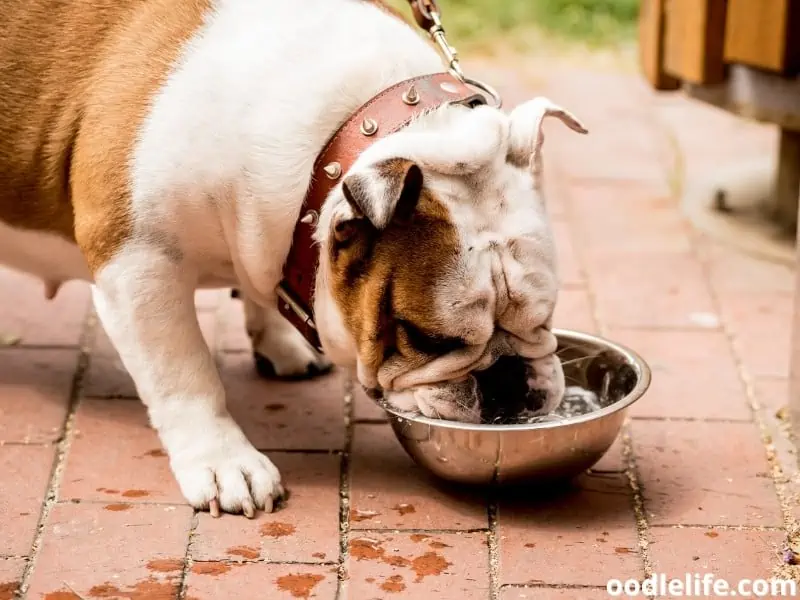
Some of the environmental factors that impact senior dogs include their living space and daily routines. For example, is their bed warm and cozy? Consider memory foam or an orthopedic bed.
Ensure there’s easy accessibility to the food and water bowls, avoiding stairs or slippery surfaces.
Outdoor areas should be designed to accommodate any mobility challenges. Make sure your senior pup’s favorite spots, like a sunny spot in the yard, are accessible, and playtime activities are tailored to their energy levels. Speaking of playtime, it’s crucial to maintain a consistent routine with regular exercise and mental stimulation to keep them active and engaged.
Behavioral factors in senior dogs often involve an increased level of anxiety, which can stem from the unfamiliar changes in their physical and mental abilities. Patience and understanding are essential when dealing with senior dogs experiencing anxiety. Keep in mind that incontinence may occur, and it’s not a matter of disobedience or lack of training.
Adjusting the frequency of potty breaks can help them stay on schedule and minimize accidents.
To reduce anxiety in senior dogs, it’s important to provide a sense of security and familiarity. Maintain their regular routines, play calming music or sounds, and consider using canine pheromone diffusers or anxiety-reducing products.
Remember, our senior dogs deserve love, attention, and understanding. With these environmental and behavioral factors in mind, we can ensure their golden years are as comfortable and enjoyable as possible. So, keep snuggling, play those gentle games of fetch, and show your senior dog just how much you cherish their loyal companionship.
Waking Up a Senior Dog
Waking up a senior dog can be quite different than waking up a younger dog, as their senses and abilities might have experienced some decline. It’s essential to approach this task with sensitivity and understanding.
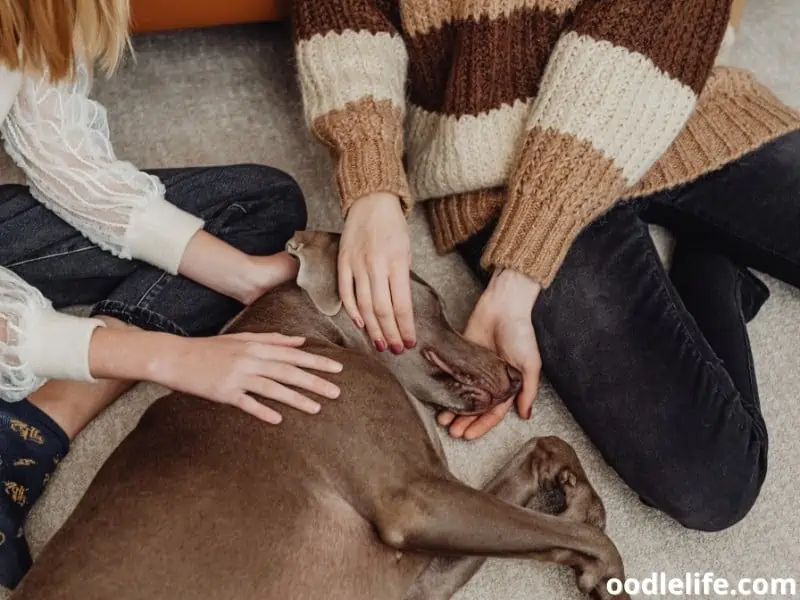
One phrase you’ve probably heard before is, “let sleeping dogs lie.” This can be especially true for senior dogs, as they need more rest and might be more irritable when disturbed. However, there are times when you need to wake up your senior dog – say, it’s time for a walk or a vet appointment.
One key thing to remember is that senior dogs may have decline in their senses, so waking them gently is crucial. Just like humans, they might experience reduced sight and hearing. This can make them a bit disoriented if they’re awakened abruptly.
For instance, your senior dog might struggle with hearing loss. Simply calling their name may not do the trick anymore. Instead, you can try gently tapping them, so that they don’t get startled.
If your dog is hard of hearing, gradually increase the volume of your voice as you call their name. Remember, patience is the name of the game.
On the other hand, if your dog’s sight is in decline, try to avoid flipping on bright lights or making sudden movements. Instead, turn on a soft light or let the natural morning light gradually wake them up. If your dog is remaining vigilant even in their sleep, you can attempt to make your approach as gentle as possible to avoid any anxiety or distress.
Think of your senior dog like a wise, seasoned detective who’s enjoying a well-deserved nap after solving some intense canine mysteries – you wouldn’t want to wake them abruptly either!
In conclusion, waking up a senior dog requires a delicate touch and understanding of their individual needs and capabilities. Pay close attention to their reactions, and always opt for gradual and gentle methods when waking them – your dog will thank you in their warm, fuzzy way.
Veterinary Care and Interventions
As our furry friends enter their golden years, it’s essential to pay extra attention to their health. Regular visits to the veterinarian can help identify any signs of age-related conditions, which can be addressed early to improve your senior dog’s comfort and overall well-being.
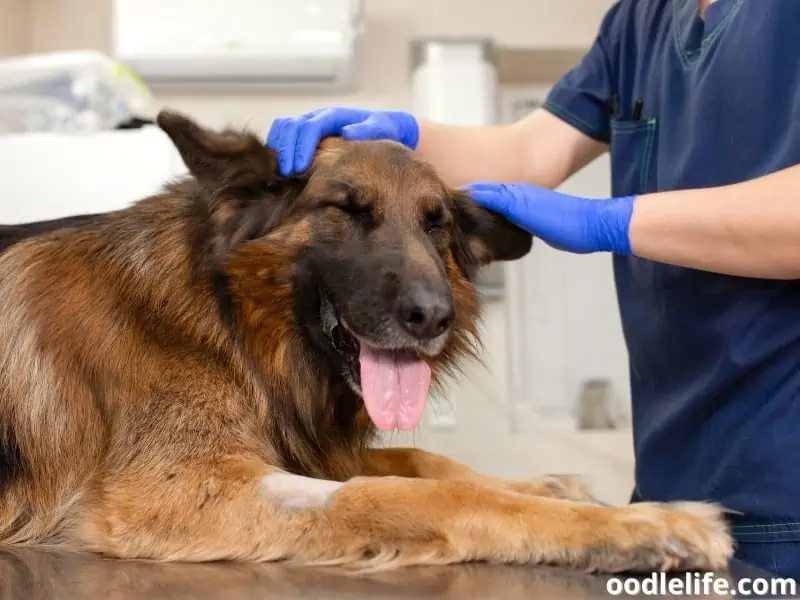
First and foremost, schedule regular check-ups with your vet. Senior dogs may require more frequent visits, depending on their health status. This allows the vet to closely monitor weight, joint health, dental health, and any potential pain your dog might be experiencing.
It’s not uncommon for older dogs to need some medication to manage pain and inflammation.
Don’t be shy about discussing your concerns with the vet. They are there to help and guide you in providing the best care for your loyal companion. Remember, vets are professionals who have dedicated their lives to ensuring that pets live their happiest and healthiest lives.
Cognitive health is also an important aspect of senior dog care. Cognitive dysfunction syndrome is a common issue in both canines and felines as they age. Be sure to inform your veterinarian about any behavioral changes in your dog, such as signs of confusion, anxiety, or sleep disturbances.
Early intervention can make a significant difference in managing these symptoms and improving your dog’s quality of life.
Lastly, don’t forget that your senior dog’s emotional well-being is just as important as their physical health. Take the time to bond with your furry companion by engaging in gentle play, providing a comfortable space for rest, and offering plenty of TLC. After all, they’ve been there for you through thick and thin, and now it’s your turn to be there for them!
Adjusting Diet and Exercise
As your senior dog ages, it’s essential to adapt their diet and exercise routine to suit their changing needs. Maintaining a proper balance of food intake and physical activity can help your fur-friend stay healthy, happy, and energetic throughout their golden years.
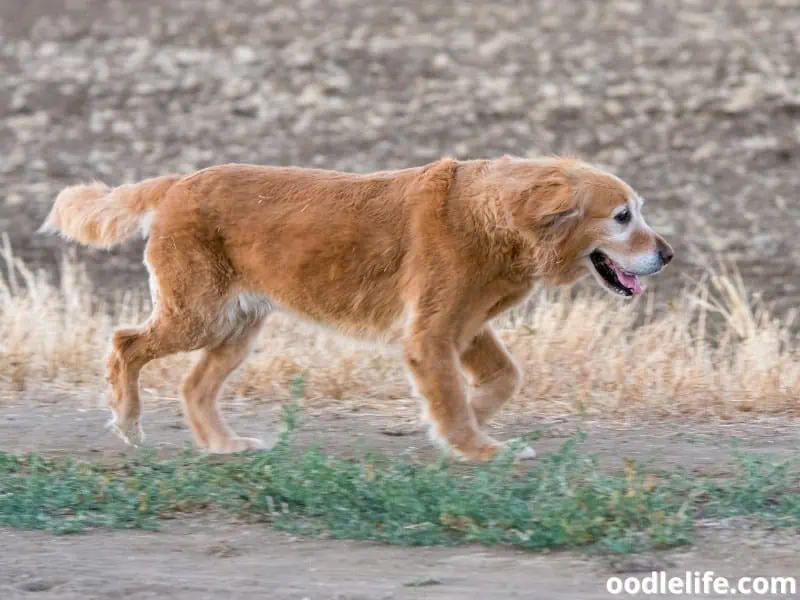
When it comes to food, be mindful of the quality and quantity your pup eats. Senior dogs often have a slower metabolism, so choosing a specialized food designed for their age group can provide the right balance of nutrients without unnecessary fillers. Pay attention to their energy levels – if your dog becomes less active, it’s essential to slightly reduce their daily calorie intake to avoid unwanted weight gain.
Always making sure your senior dog has access to fresh water is equally important, especially after exercise, to keep them well-hydrated and refreshed.
Physical activity is still essential for senior dogs. While they may not have the same pep in their step as they did during their younger years, exercise helps maintain muscle tone and joint mobility. A leisurely walk around the neighborhood, for example, can keep your pup engaged and energetic, while also providing mental stimulation from sniffing around and exploring.
You can even introduce low-impact exercises, such as swimming, which can be soothing for achy joints.
When it comes to training, be patient with your senior dog. They may not have the same level of focus or ability they once had, but it’s never too late to teach an old dog new tricks! Keep training sessions short, simple, and fun to hold their interest and not over-tax their attention span.
It’s important to use positive reinforcement and reward-based training methods to encourage your senior pup’s efforts.
Lastly, don’t be surprised if your dog starts to pant more frequently, as it’s a natural way for them to cool down. Keep an eye on panting—especially during exercise—and offer plenty of rest breaks to ensure your buddy doesn’t become overheated.
Adjusting your senior dog’s diet and exercise routine can make a world of difference in their overall well-being. With the right balance, you’ll be helping your furry companion enjoy a happy, more comfortable transition into their golden years.
Addressing Additional Concerns
As your senior dog navigates through its golden years, keeping their mental and physical health in mind is essential. There may be challenges that arise, but with our guidance, we’ll help you tackle them like a pro.
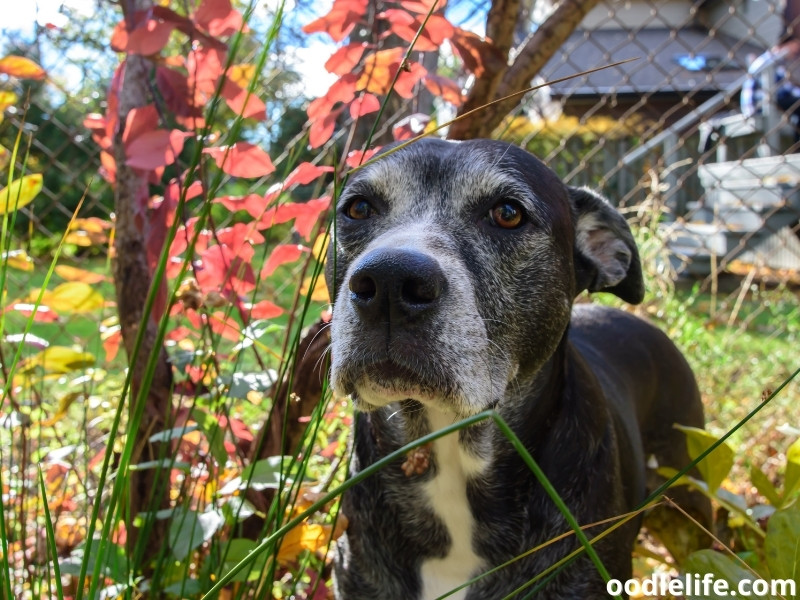
When it comes to learning and memory, older dogs may not be as quick to pick up new tricks. Don’t stress it; trying to teach Fido the latest canine dance routine isn’t necessary. Focus on maintaining their existing skills and gently reinforcing them, so they continue to thrive.
With age, some dogs may start to wander aimlessly or seem disoriented. It’s essential to create a safe environment for them, so they don’t accidentally injure themselves. Keep pathways clear and furniture rearranged minimally to avoid surprises.
It’s quite common for senior dogs to experience dental issues, so be sure to keep an eye on their teeth. Regular checkups with the vet will ensure their chompers stay in top shape. And who knows, you might even find yourself a new chew toy on those visits!
As for potty duty, older pooches may struggle with bladder control. It’s important to remind them of their potty training by taking them for more frequent bathroom breaks. No one appreciates an over-enthusiastic game of “surprise puddle tag” in the house.
Finally, during your dog’s senior years, they might become more prone to injuries. Their joints may not be as spry as they used to be, and chasing squirrels will undoubtedly become a thing of the past. To prevent injuries, consider investing in a memory foam bed and a non-slip mat for slippery surfaces.
Your four-legged friend will thank you with a wag of their tail.